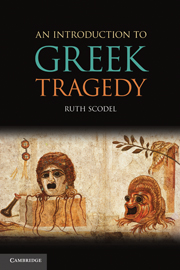12 - Orestes
Published online by Cambridge University Press: 05 June 2012
Summary
Orestes, produced in 408 BCE, was one of the most popular of all tragedies in antiquity, often reperformed in the Hellenistic period. It is, however, not an edifying play. The characters are not heroic or virtuous, and they move through a world in which people do not act out of a sense of honor or justice but in pursuit of ordinary self-interest or political partisanship. Furthermore, too much happens. It may seem a surprising complaint about a plot that is so meticulously constructed, but the play lacks conventional unity – its main character is not consistent, and its tone varies wildly from scene to scene. Orestes is about people who are desperate, and in their desperation, they grab at one possible solution to their situation after another. At its end, Apollo appears from the machine. Usually, the final appearance of a god clarifies what has happened already and predicts the future of the characters, but in this play (as in Sophocles' Philoctetes), the god must move the characters in a new direction. Orestes was neglected or treated with hostility in the nineteenth century. It was easily put into what I have called “The Story,” an instance of Euripidean decadence. The play began to receive more sympathetic attention in the second half of the twentieth century, when the moral confusion of late Euripides seemed to parallel the difficulties of modernity, and the play's reworkings of earlier versions attracted readers interested in intertextuality.
- Type
- Chapter
- Information
- An Introduction to Greek Tragedy , pp. 174 - 185Publisher: Cambridge University PressPrint publication year: 2010



